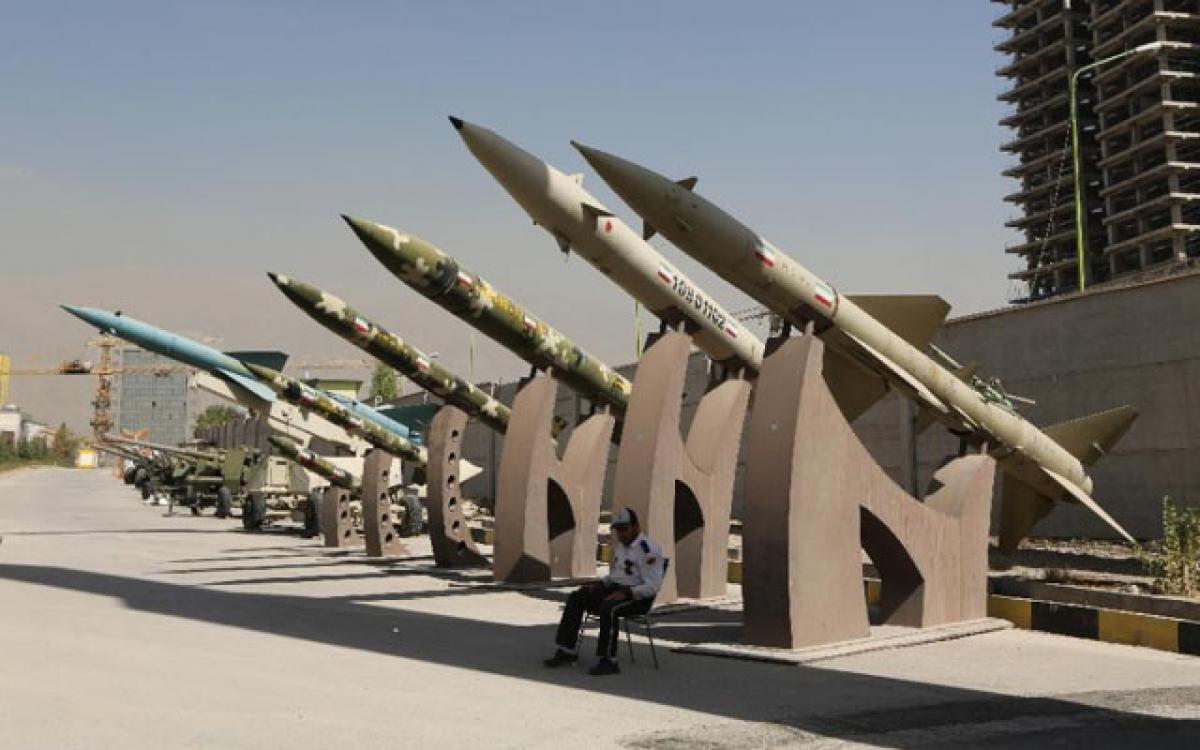Live
- Chanchalguda Jail Officials Say They Haven't Received Bail Papers Yet, Allu Arjun May Stay in Jail Tonight
- BJP leaders present evidence of illegal voters in Delhi, urge EC for swift action
- Exams will not be cancelled: BPSC chairman
- Nagesh Trophy: Karnataka, T.N win in Group A; Bihar, Rajasthan triumph in Group B
- YS Jagan condemns the arrest of Allu Arjun
- Economic and digital corridors to maritime connectivity, India and Italy building vision for future, says Italian Ambassador
- SMAT 2024: Patidar's heroics guide Madhya Pradesh to final after 13 years
- CCPA issues notices to 17 entities for violating direct selling rules
- Mamata expresses satisfaction over speedy conviction in minor girl rape-murder case
- Transparent Survey Process for Indiramma Housing Scheme Directed by District Collector
Just In

West’s worry: Keeping tabs on Iran’s military. The contentious nuclear deal struck on July 14 between Iran and the five permanent members of the UN Security Council plus Germany (P5+1) in the Austrian capital city of Vienna has been described as a win-win for everybody.
The big worry for the US and allied leaders is not that Iran might have nuclear energy, but that it would have nuclear missiles and bombs. Thus, Iran's military – which would have a role in weaponising such technology – has to be part of the discussion
New Delhi: The contentious nuclear deal struck on July 14 between Iran and the five permanent members of the UN Security Council plus Germany (P5+1) in the Austrian capital city of Vienna has been described as a win-win for everybody.
.jpg)
But an analysis of the 100-page agreement reveals certain cold facts that may dampen celebrations. In a long-running dialogue rife with mistrust, Iran and its interlocutors, including the US, had been working on the deal for many years amid efforts to curtail Tehran's nuclear capability and lifting of almost a decade-old economic sanctions against the Iranian nation.
The Joint Comprehensive Plan of Action (JCPoA), as the present deal has been called, states that "Iran reaffirms that under no circumstances will it ever seek, develop or acquire nuclear weapons.” The distinction here was between nuclear weaponry and nuclear power.
Iran's state-run Islamic Republic News Agency (IRNA) stressed that, under the deal, "world powers have recognised Iran's peaceful nuclear programme and are to respect the nuclear rights of Iran within international conventions,” adding that no Iranian nuclear facilities or centrifuges would be dismantled, including the heavy water reactor in Arak (250 km from Tehran).
IRNA also stated that "the policy of preventing enrichment (of) uranium has now failed and Iran will go ahead with its enrichment programme.” The agreement will also enable Iranian scholars to pursue studies in the nuclear field.
None of these points indicates that Iran's nuclear programme would change significantly. The agreement didn't focus on what the Iranian government must do to downsize its nuclear programme, but the US State Department did, in its synopsis of the agreement.
It said that Iran would:
- Keep its uranium enrichment levels at no more than 3.67 per cent down from near 20 per cent;
- Maintain a uranium stockpile (at the above prescribed level) under 300 kg, well below its current 10,000-kg stockpile. (President Barack Obama said this works out to Iran reducing its nuclear stockpile by 98 per cent);
- Phase out its IR-1 centrifuges within 10 years, keeping over 5,000 centrifuges running during this stretch at its Natanz facility, Iran's central facility for enrichment with over 19,000 centrifuges currently operational;
- Not have any nuclear material at its Fordow facility, the site of an underground uranium enrichment facility, for 15 years, and will convert that site "into a nuclear, physics and technology centre.”; and
- “Design and rebuild a modernised heavy water research reactor in Arak... using fuel enrichment up to 3.67 per cent” after getting international authorities' green signal on the final design.
- “This deal is not built on trust; it is built on verification,” Obama said. "Inspectors will have 24/7 access to Iran's key nuclear facilities." Inspectors look likely to spend the bulk of their time at Iran's established nuclear facilities like Natanz, Fordow and Arak.
- The big worry for the US and allied leaders was not that Iran might have nuclear energy, but that it would have nuclear missiles and bombs. Thus, Iran's military – which would have a role in weaponising such technology – has to be part of the discussion.
International Atomic Energy Agency (IAEA) chief Yukiya Amano noted that the UN's nuclear watchdog agency and Iran have reached "a separate agreement regarding the issue of Parchin," a military site. This suggests that international inspectors would get some access at least to that base southeast of Tehran, though it's not clear how much or if they'll be able to check on other military sites.
It's not clear as to what extent all parties to the Vienna agreement, though, will loosen up on military matters. The US, for instance, insists that it would continue to enforce sanctions tied to "Iran's support for terrorism, human rights abuses and missile activities". To what extent, though, remains to be seen.
By Aadil Mir

© 2024 Hyderabad Media House Limited/The Hans India. All rights reserved. Powered by hocalwire.com







